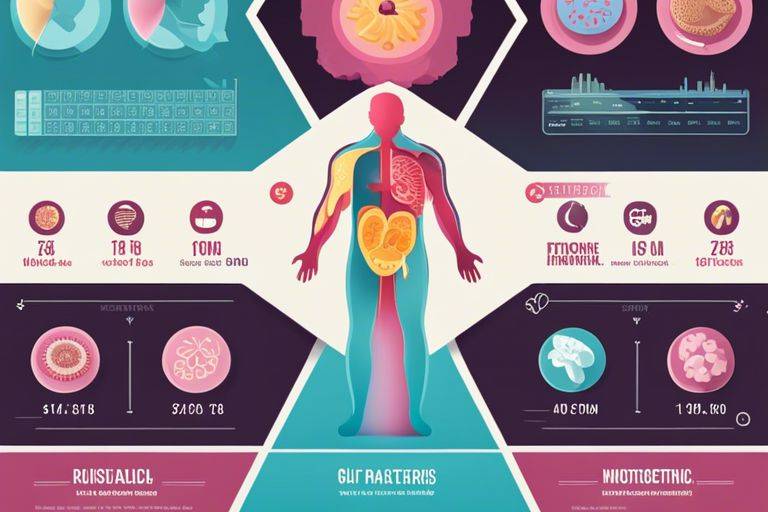Just imagine a healthier you in 30 days! Optimizing your gut health is crucial for overall well-being. In this guide, I’ll share effective tips and strategies to help you improve digestion, boost immunity, and increase energy levels. By following this plan, you’ll set yourself up for a healthier future by 2024.
![- How to Maximize Gut Health in 30 Days [by 2024] 2 maximizing gut health in 30 days rcf](https://thinkactthrive.com/wp-content/uploads/2024/08/maximizing-gut-health-in-30-days-rcf.jpg)
Key Takeaways:
- Diverse Diet: Incorporate a wide variety of fruits, vegetables, whole grains, and lean proteins into your daily meals.
- Probiotic Foods: Include probiotic-rich foods like yogurt, kefir, sauerkraut, and kimchi to promote good gut bacteria.
- Prebiotic Foods: Consume prebiotic foods such as bananas, onions, garlic, and asparagus to feed the beneficial bacteria in your gut.
- Hydration: Drink plenty of water throughout the day to support digestion and nutrient absorption.
- Reduce Stress: Use stress-reducing techniques like meditation, yoga, or deep breathing exercises to improve gut health.
- Avoid Processed Foods: Limit your intake of processed foods, sugar, and artificial additives that can negatively impact gut bacteria.
- Exercise Regularly: Stay active with regular exercise to promote a healthy gut microbiome and overall well-being.
![- How to Maximize Gut Health in 30 Days [by 2024] 3 maximizing gut health in 30 days bpj](https://thinkactthrive.com/wp-content/uploads/2024/08/maximizing-gut-health-in-30-days-bpj.jpg)
Understanding Gut Health
The Importance of Gut Health
To maximize your gut health, you need to understand its importance. One of the key roles your gut plays is in supporting your immune system. A healthy gut can help reduce inflammation, increase nutrient absorption, and promote overall well-being.
Common Gut Health Issues
To address common gut health issues, it’s crucial to recognize symptoms like bloating, gas, constipation, or diarrhea. These signs can indicate an imbalance in your gut flora, leading to digestive discomfort and potential long-term health problems.
Common gut health issues can impact your daily life and overall health. Ignoring these symptoms can lead to more severe conditions like leaky gut syndrome, irritable bowel syndrome (IBS), or even autoimmune disorders. It’s crucial to address these issues promptly to prevent further complications and improve your gut health.
Factors Affecting Gut Health
If you’re looking to maximize your gut health in 30 days, it’s crucial to understand the factors that can impact it. Here are some key elements to consider:
- Diet and Nutrition: You are what you eat, and your gut health directly reflects this. Focus on incorporating plenty of fiber, probiotics, and prebiotics into your diet to support a diverse and healthy microbiome.
Lifestyle Choices
Now, let’s talk about the impact of your lifestyle choices on your gut health.
- Understanding how your choices in exercise, stress management, and sleep can influence your gut health is necessary. Prioritize regular physical activity, stress-reducing practices, and quality sleep to support a thriving gut.
Environmental Toxins
There’s a lot to be aware of when it comes to the impact of environmental toxins on your gut health. To learn more about this, check out How to maintain a healthy gut microbiome in 2024.
Stress and Sleep
Factors like stress and sleep can significantly affect your gut health. By managing stress levels through techniques like meditation or yoga, and prioritizing adequate sleep, you can create a more supportive environment for your gut microbiome.
![- How to Maximize Gut Health in 30 Days [by 2024] 4 maximizing gut health in 30 days ncs](https://thinkactthrive.com/wp-content/uploads/2024/08/maximizing-gut-health-in-30-days-ncs.jpg)
Tips for Improving Gut Health
All efforts to maximize gut health start with small, consistent changes in your daily habits. Here are some simple yet effective tips to improve your gut health in just 30 days:
Increase Fiber Intake
Clearly, fiber is crucial for a healthy gut as it helps regulate bowel movements, promotes gut motility, and feeds beneficial gut bacteria. Incorporate more whole grains, fruits, vegetables, nuts, and seeds into your diet to boost your fiber intake and support a balanced microbiome. Assume that, by increasing your fiber consumption gradually, you can prevent bloating and discomfort often associated with sudden dietary changes.
Incorporate Probiotics and Prebiotics
Tips to integrate probiotics and prebiotics into your daily routine include consuming fermented foods, yogurt, kefir, sauerkraut, and chicory root, onions, bananas, and garlic. These “good” bacteria and indigestible fibers can enhance gut health by promoting the growth of beneficial microbes and improving digestion. Assume that by diversifying your food choices, you can introduce a wider range of beneficial bacteria into your gut.
Stay Hydrated
Even though drinking enough water is often overlooked, hydration is key to maintaining a healthy gut as it aids in digestion, nutrient absorption, and waste removal. Make sure to drink at least 8-10 glasses of water daily and limit excessive caffeine and alcohol consumption, which can dehydrate the body. Assume that proper hydration supports the mucosal lining of the intestines, promoting overall gut health.
Exercise Regularly
With regular physical activity, you can not only improve your overall health and well-being but also enhance your gut health by reducing inflammation and promoting a diverse microbiome. Engaging in moderate exercises like walking, jogging, yoga, or dancing can stimulate gut motility and support the balance of gut bacteria. It is pivotal to find activities you enjoy and make them a consistent part of your routine for optimal gut health.
Manage Stress
The connection between stress and gut health is profound, as high stress levels can disrupt the balance of gut microbes and impair digestion. Manage stress through meditation, deep breathing, yoga, or mindfulness practices to support a healthy gut-brain axis and overall well-being. Prioritizing self-care and stress-reducing activities can positively impact your gut health and enhance your body’s resilience to daily stressors.
How to Create a Gut-Friendly Diet
Unlike Eating 30 plants a week will strengthen your gut. … – Fortune, creating a gut-friendly diet is necessary for improving your overall gut health. Here are some key tips to help you maximize your gut health in just 30 days.
Eliminate Processed Foods
Some of the biggest culprits that can harm your gut health are processed foods. These items often contain unhealthy additives, preservatives, and artificial ingredients that can disrupt the balance of good bacteria in your gut. By cutting out processed foods from your diet, you can support a healthier gut environment and promote better digestion.
Focus on Whole, Unprocessed Foods
If you want to maximize your gut health, focusing on whole, unprocessed foods is key. These foods are rich in necessary nutrients, fiber, and antioxidants that can nourish your gut microbiota and support a healthy digestive system. Incorporating plenty of fruits, vegetables, whole grains, lean proteins, and healthy fats into your daily meals can help improve your gut health significantly.
Create a colorful plate filled with a variety of nutrient-dense foods to provide your gut with the necessary nutrients it needs to thrive.
Incorporate Fermented Foods
If you’re looking to boost your gut health, incorporating fermented foods into your diet can be extremely beneficial. Fermented foods like yogurt, kefir, sauerkraut, and kimchi are rich in probiotics, which are beneficial bacteria that can help promote a healthy gut microbiome. These foods can help improve digestion, reduce inflammation, and enhance nutrient absorption in your gut.
If you’re new to fermented foods, start by adding small portions to your meals and gradually increase your intake to allow your gut to adjust to these beneficial bacteria.
Consider a Low-FODMAP Diet
Little did I know how much certain foods can impact my gut health until I discovered the Low-FODMAP diet. This diet focuses on reducing foods that are high in fermentable carbohydrates that can cause digestive issues for some individuals. By following a Low-FODMAP diet, you can identify and eliminate foods that may be triggering gut symptoms like bloating, gas, and stomach pain.
Diet modifications can have a significant impact on your gut health, so consulting with a healthcare professional or a dietitian before making changes is necessary to ensure you’re meeting your nutritional needs while supporting your gut health.
Supplements and Probiotics for Gut Health
Choosing the Right Probiotic
Now, let’s talk about probiotics – the good bacteria that are crucial for gut health. When choosing a probiotic supplement, make sure to look for strains like Lactobacillus and Bifidobacterium as they are known for their beneficial effects on digestion and overall gut health. Be sure to select a high-quality product with multiple strains and a high CFU count for maximum effectiveness.
Benefits of Omega-3 Fatty Acids
The omega-3 fatty acids found in fish oil are vital for a healthy gut. They have anti-inflammatory properties that can help reduce gut inflammation and promote a healthy gut lining. Incorporating omega-3 supplements into your daily routine can also support a diverse microbiome, which is vital for optimal gut health.
Benefits: Omega-3 fatty acids play a crucial role in reducing inflammation in the gut, which can help alleviate symptoms of conditions like irritable bowel syndrome (IBS) and inflammatory bowel disease (IBD). By supporting a diverse microbiome, omega-3 fatty acids also contribute to overall gut health and can enhance gut barrier function.
Other Supplements for Gut Health
If you’re looking to optimize your gut health, consider adding other supplements like glutamine, zinc, and digestive enzymes to your daily regimen. Glutamine can help repair the intestinal lining, zinc supports immune function in the gut, and digestive enzymes aid in the breakdown and absorption of nutrients. These supplements can work synergistically with probiotics and omega-3 fatty acids to enhance your gut health.
If you’re experiencing specific gut issues like leaky gut syndrome or chronic digestive issues, it’s important to consult with a healthcare professional before starting any new supplements. They can help you determine the best combination of supplements for your individual needs and ensure they won’t interact negatively with any medications you may be taking.
![- How to Maximize Gut Health in 30 Days [by 2024] 5 maximizing gut health in 30 days tym](https://thinkactthrive.com/wp-content/uploads/2024/08/maximizing-gut-health-in-30-days-tym.jpg)
Lifestyle Changes for Optimal Gut Health
Get Enough Sleep
Despite our busy schedules, getting enough sleep is crucial for your gut health. Lack of sleep can disrupt the balance of good and bad bacteria in your gut, leading to inflammation and digestive issues. Even just one week of insufficient sleep can have a negative impact on your gut flora.
Practice Good Hygiene
Lifestyle changes such as practicing good hygiene play a significant role in maintaining optimal gut health. To ensure a healthy gut, wash your hands regularly, especially before eating, and avoid using antibiotics unnecessarily. These simple habits can help protect the delicate balance of bacteria in your gut.
To support a healthy gut, it’s important to maintain good hygiene practices like washing your hands regularly, especially before handling food.
Reduce Exposure to Toxins
An important aspect of promoting gut health is reducing your exposure to toxins. Avoiding pesticides in food, opting for organic produce, and using natural cleaning products are some ways to minimize toxin exposure and support a healthier gut environment.
Reducing exposure to toxins is crucial for your gut health. By choosing organic foods and natural cleaning products, you can help protect your gut from harmful substances that can disrupt its delicate balance.
Manage Chronic Stress
While some stress is a natural part of life, chronic stress can wreak havoc on your gut health. High levels of stress can lead to inflammation in the gut, compromising its function and altering the composition of its microbiota. Finding healthy ways to manage stress, such as meditation, exercise, and mindfulness practices, is key to supporting a healthy gut.
While some stress is unavoidable, it’s important to manage chronic stress effectively to protect your gut health. Incorporating techniques like meditation, exercise, and mindfulness can help reduce the negative impact of stress on your digestive system.
Summing up
From above information, I’ve learned that maximizing gut health in 30 days is achievable through a combination of diet, supplementation, and lifestyle changes. By focusing on incorporating probiotic foods, prebiotic fiber, and fermented foods into your diet, while also managing stress levels, getting adequate sleep, and staying hydrated, you can make significant improvements to your gut health. Consistency is key, so make sure to stick to the plan and track your progress to see the positive impact on your overall well-being.
FAQ
Q: What is the importance of gut health?
A: Gut health is important because it plays a crucial role in digestion, nutrient absorption, immune function, and overall health.
Q: What are some signs that indicate poor gut health?
A: Some signs of poor gut health include bloating, gas, diarrhea, constipation, fatigue, and food intolerances.
Q: How can I improve my gut health in 30 days?
A: You can improve your gut health in 30 days by following a balanced diet rich in fiber, probiotics, and prebiotics, staying hydrated, managing stress, and getting enough sleep.
Q: What foods should I include in my diet to promote gut health?
A: Foods that promote gut health include yogurt, kefir, sauerkraut, kimchi, garlic, onions, bananas, oats, and whole grains.
Q: Are there any supplements that can help improve gut health?
A: Probiotic supplements and prebiotic supplements can be beneficial for improving gut health by promoting the growth of beneficial bacteria in the gut.
Q: How important is hydration for gut health?
A: Adequate hydration is important for gut health as it helps to keep things moving smoothly through the digestive system and prevents constipation.
Q: Can exercise help improve gut health?
A: Exercise can help improve gut health by reducing inflammation, promoting healthy gut bacteria, and supporting overall digestive function.
![- How to Maximize Gut Health in 30 Days [by 2024] 1 maximizing gut health in 30 days mea](https://thinkactthrive.com/wp-content/uploads/2024/08/maximizing-gut-health-in-30-days-mea.jpg)


